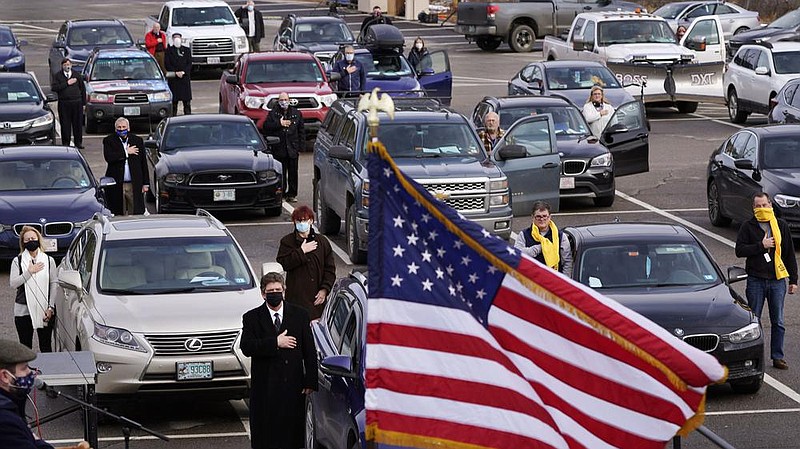New York's governor threatened to fine hospitals if they don't use their allotment of covid-19 vaccine fast enough. His South Carolina counterpart warned health care workers they have until Jan. 15 to get a shot or move to the back of the line. California's governor wants to use dentists to vaccinate people.
With frustration rising over the sluggish rollout of the vaccine, state leaders and other politicians around the U.S. are turning up the pressure, improvising and seeking to bend the rules to get shots in arms more quickly.
Meanwhile, U.S. Health and Human Services Secretary Alex Azar said Wednesday that the government will allow more drugstores to start giving vaccinations to speed up the process. If health workers aren't lining up fast enough, he said, it is OK to expand eligibility to lower-priority groups.
"We need to not be overly prescriptive in that, especially as we see governors who are leaving vaccines sitting in freezers rather than getting it out into people's arms," he said.
[CORONAVIRUS: Click here for our complete coverage » arkansasonline.com/coronavirus]
As of Wednesday, more than three weeks into the U.S. vaccination campaign, 5.3 million people had gotten their first shot out of the 17 million doses distributed so far, according to the Centers for Disease Control and Prevention. While that is believed to be an undercount because of a lag in reporting, health officials are still well behind where they wanted to be.
The slow rollout has been blamed on a multitude of problems, including a lack of funding and direction from Washington, mismatches between supply and demand, a patchwork of approaches by state and local governments, distrust of the vaccine, and disarray created by the holidays.
Across much of the nation, health care workers and nursing home residents are being given priority for the initial, limited supplies of the vaccine at this stage. But pressure is building to let other groups step up, and some states -- Alaska, Mississippi and Louisiana -- have given the OK for the elderly to start receiving shots over the next few days.
The U.S. has an estimated 21 million health care workers and 3 million residents of nursing homes and other long-term care centers. The CDC said about 512,000 people in such centers have been vaccinated through a partnership between the government and the CVS and Walgreens drugstore chains.
CVS said Wednesday that it has completed coronavirus vaccinations at more than 100 long-term care facilities in Missouri, but that it still has 500 more to go.
[Video not showing up above? Click here to watch » https://www.youtube.com/watch?v=IhSM0i94eUY]
The U.S. Department of Health and Senior Services last year selected CVS Health and Walgreens to administer vaccinations at nursing homes and other long-term care facilities across the U.S. In Missouri, vaccinations began Dec. 28.
CVS said it expects to finish administering the first round of covid-19 vaccine doses in the nation's long-term care facilities by Jan. 25, the St. Louis Post-Dispatch reported. Pharmacists will visit each facility three times, to administer the first and second doses to staff and residents. Missouri is using vaccine from biotech company Moderna at nursing homes, and it requires two doses, 28 days apart.
Meanwhile, the top U.S. drug regulator is resisting calls to tinker with how covid-19 vaccines are administered, sticking to the scientific evidence and its own procedures.
There have been increasing calls worldwide to experiment with dosing regimens to speed up inoculation efforts and arrest a worsening pandemic. However, the Food and Drug Administration's leadership pledged in a statement late Monday "to make decisions based on data and science."
Extending the length of time between shots, or cutting doses by half, hasn't been studied in clinical trials and could put "public health at risk," said FDA Commissioner Stephen Hahn and Peter Marks, director of the agency's office that oversees vaccines, in the statement.
On Wednesday, the FDA's stand drew strong support from Francis Collins, the head of the National Institutes of Health, who said any changes in how the shots are given without more data on the effects could prove harmful. "Let's not make stuff up," he said during a Washington Post event.
Separately, after briefing reporters Monday on plans to deliver coronavirus vaccines to Nebraska meatpacking plants, Republican Gov. Pete Ricketts was asked whether workers in the U.S. without authorization would be included.
"You're supposed to be a legal resident of the country to be able to be working in those plants," Ricketts replied. "So I do not expect that illegal immigrants will be part of the vaccine with that program."
When his comments quickly went viral, stoking anger from critics, Nebraska officials rushed to clarify. Immigrants would still qualify for the vaccine, one Ricketts aide said, but those without legal status would have to wait at the back of the line.
"Nebraska is going to prioritize citizens and legal residents ahead of illegal immigrants," the governor's communications director, Taylor Gage, wrote on Twitter on Monday.
Gage later clarified that U.S. citizenship was not a requirement to receive the vaccine, noting that "the federal government is expected to eventually make enough vaccine available for everyone in the country."
Information for this article was contributed by Michelle R. Smith of The Associated Press; by Anna Edney and Jeannie Baumann of Bloomberg News; and by Teo Armus of The Washington Post.







